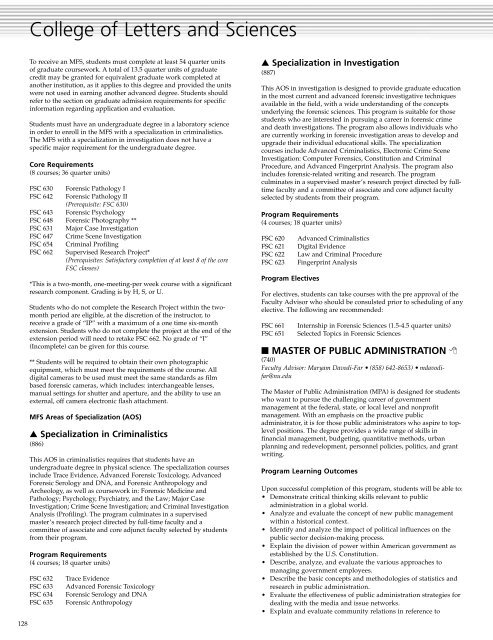Catalog 73 - National University
Catalog 73 - National University
Catalog 73 - National University
- No tags were found...
You also want an ePaper? Increase the reach of your titles
YUMPU automatically turns print PDFs into web optimized ePapers that Google loves.
College of Letters and Sciences128To receive an MFS, students must complete at least 54 quarter unitsof graduate coursework. A total of 13.5 quarter units of graduatecredit may be granted for equivalent graduate work completed atanother institution, as it applies to this degree and provided the unitswere not used in earning another advanced degree. Students shouldrefer to the section on graduate admission requirements for specificinformation regarding application and evaluation.Students must have an undergraduate degree in a laboratory sciencein order to enroll in the MFS with a specialization in criminalistics.The MFS with a specialization in investigation does not have aspecific major requirement for the undergraduate degree.Core Requirements(8 courses; 36 quarter units)FSC 630 Forensic Pathology IFSC 642 Forensic Pathology II(Prerequisite: FSC 630)FSC 643 Forensic PsychologyFSC 648 Forensic Photography **FSC 631 Major Case InvestigationFSC 647 Crime Scene InvestigationFSC 654 Criminal ProfilingFSC 662 Supervised Research Project*(Prerequisites: Satisfactory completion of at least 8 of the coreFSC classes)*This is a two-month, one-meeting-per week course with a significantresearch component. Grading is by H, S, or U.Students who do not complete the Research Project within the twomonthperiod are eligible, at the discretion of the instructor, toreceive a grade of “IP” with a maximum of a one time six-monthextension. Students who do not complete the project at the end of theextension period will need to retake FSC 662. No grade of “I”(Incomplete) can be given for this course.** Students will be required to obtain their own photographicequipment, which must meet the requirements of the course. Alldigital cameras to be used must meet the same standards as filmbased forensic cameras, which includes: interchangeable lenses,manual settings for shutter and aperture, and the ability to use anexternal, off camera electronic flash attachment.MFS Areas of Specialization (AOS)▲ Specialization in Criminalistics(886)This AOS in criminalistics requires that students have anundergraduate degree in physical science. The specialization coursesinclude Trace Evidence, Advanced Forensic Toxicology, AdvancedForensic Serology and DNA, and Forensic Anthropology andArcheology, as well as coursework in: Forensic Medicine andPathology; Psychology, Psychiatry, and the Law; Major CaseInvestigation; Crime Scene Investigation; and Criminal InvestigationAnalysis (Profiling). The program culminates in a supervisedmaster’s research project directed by full-time faculty and acommittee of associate and core adjunct faculty selected by studentsfrom their program.Program Requirements(4 courses; 18 quarter units)FSC 632FSC 633FSC 634FSC 635Trace EvidenceAdvanced Forensic ToxicologyForensic Serology and DNAForensic Anthropology▲ Specialization in Investigation(887)This AOS in investigation is designed to provide graduate educationin the most current and advanced forensic investigative techniquesavailable in the field, with a wide understanding of the conceptsunderlying the forensic sciences. This program is suitable for thosestudents who are interested in pursuing a career in forensic crimeand death investigations. The program also allows individuals whoare currently working in forensic investigation areas to develop andupgrade their individual educational skills. The specializationcourses include Advanced Criminalistics, Electronic Crime SceneInvestigation: Computer Forensics, Constitution and CriminalProcedure, and Advanced Fingerprint Analysis. The program alsoincludes forensic-related writing and research. The programculminates in a supervised master’s research project directed by fulltimefaculty and a committee of associate and core adjunct facultyselected by students from their program.Program Requirements(4 courses; 18 quarter units)FSC 620FSC 621FSC 622FSC 623Program ElectivesAdvanced CriminalisticsDigital EvidenceLaw and Criminal ProcedureFingerprint AnalysisFor electives, students can take courses with the pre approval of theFaculty Advisor who should be consulsted prior to scheduling of anyelective. The following are recommended:FSC 661FSC 651Internship in Forensic Sciences (1.5-4.5 quarter units)Selected Topics in Forensic Sciences■ MASTER OF PUBLIC ADMINISTRATION (740)Faculty Advisor: Maryam Davodi-Far • (858) 642-8653) • mdavodifar@nu.eduThe Master of Public Administration (MPA) is designed for studentswho want to pursue the challenging career of governmentmanagement at the federal, state, or local level and nonprofitmanagement. With an emphasis on the proactive publicadministrator, it is for those public administrators who aspire to toplevelpositions. The degree provides a wide range of skills infinancial management, budgeting, quantitative methods, urbanplanning and redevelopment, personnel policies, politics, and grantwriting.Program Learning OutcomesUpon successful completion of this program, students will be able to:• Demonstrate critical thinking skills relevant to publicadministration in a global world.• Analyze and evaluate the concept of new public managementwithin a historical context.• Identify and analyze the impact of political influences on thepublic sector decision-making process.• Explain the division of power within American government asestablished by the U.S. Constitution.• Describe, analyze, and evaluate the various approaches tomanaging government employees.• Describe the basic concepts and methodologies of statistics andresearch in public administration.• Evaluate the effectiveness of public administration strategies fordealing with the media and issue networks.• Explain and evaluate community relations in reference to
















